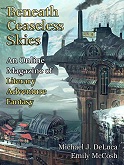 Beneath Ceaseless Skies #266, December 6, 2018
Beneath Ceaseless Skies #266, December 6, 2018
“Forest Spirits” by Michael J. DeLuca
Reviewed by Gyanavani
In “Forest Spirits” Michael J. DeLuca deals with the intervening period between the first heady call for a political uprising and the second more systematic, more deliberate presentation of facts that will tear down, brick by brick, the existing order.
Our protagonists, Cole and Tethas, are fleeing through a treacherous Forest from the city where only the night before they had presented an incendiary mask. They are followed by legendary Hunters, a group of people whose original mission to keep the Forest and its powers safe has been corrupted by the dictatorial government into catching and punishing people considered enemies of the existing way of life. Tethas is the dancer and so the face of the revolution, Cole is the writer and therefore (though not entirely since he gives Tethas credit for active involvement in the writing process) the brains of the operation.
This story is well-paced and interesting. I enjoyed traveling through a world straining under natural disasters where whole forests have disappeared, birds are extinct as are the smaller insects like ants and mosquitoes, and larger animals, like deer, are starving.
There are two major problems with this story. The first one is that fantasy has milked the trope of artists bringing about revolutions with their work to the point that it is now a cliché. The second is Cole. He is the voice of this tale. Through his adoring eyes we successfully see Tethas’ captivating dancing abilities, her enchanting beauty, and her simple but awful power to face situations head on. But his character is as bland as his name. In every situation he gives someone else the lead. When he talks of his childhood, his father comes across as the colorful one; when he talks of his youth, it’s Tethas.
Emily McCosh’s “Frozen Meadow, Shining Sun” is a story of two sisters, Aimi and Opere, who would have been separated by their genetic differences but for the strength and determination of Opere. Aimi takes after her mother and is a kitsune—both a fox and a woman able to change into either form at will. Opere, the younger sister, takes after her father and is fully human. Since their father’s tribe rejects the kitsune folk, Aimi is forced to choose, but unlike her mother she chooses her non-human connections.
This coming of age story for Opere, who tells the story, is dramatic. Opere braves a winter storm, travels through the woods that had always frightened her, gives up loving parents for her sister—and yet manages to remain indistinct. That said, the writing was a trifle shrill.